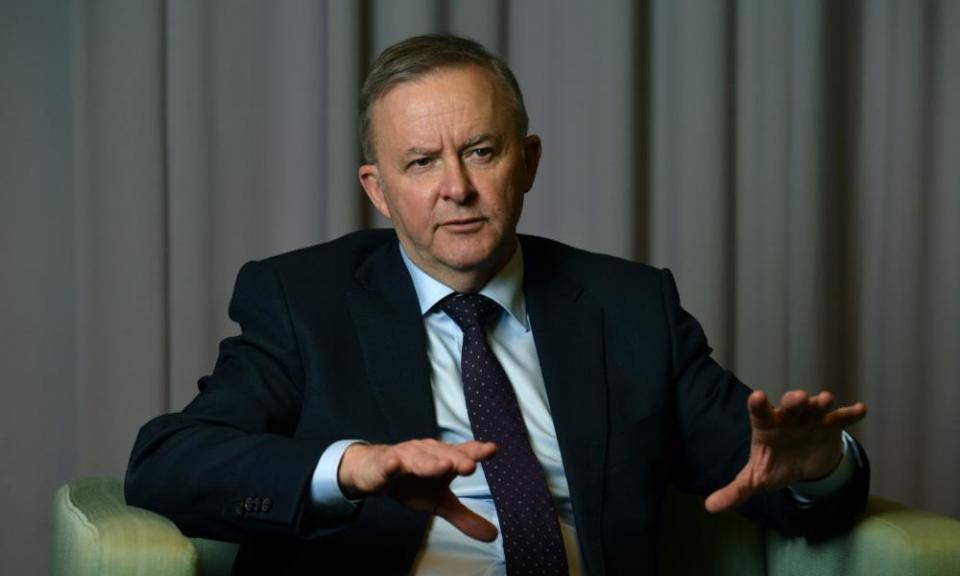Labor has led Coalition in eight of nine Guardian Essential polls, analysis shows

As Scott Morrison prepares to depart Australia for two key international summits, the latest quarterly breakdown of Guardian Essential polling shows Labor has been in front of the Coalition in eight of the last nine surveys.
Labor hit a quarterly high in the most recent fortnightly poll of 1,781 respondents. On a traditional two-party preferred measure, the opposition is currently in front of the government 53% to 47%. When undecided voters were highlighted, Labor led 49% to 44%, with 6% of respondents undecided.
Voting intention figures calculated by Guardian Essential now express the key metric as two-party preferred “plus”. The change in methodology, adopted after the 2019 election, highlights the proportion of undecided voters in any survey, giving people a more accurate read on the limits of any prediction.
Related: Guardian Essential poll: most Australians want Morrison to set a higher emissions reduction target
The Coalition’s strongest political showing this quarter was back in September, when the major parties were on level pegging on 46% – with 8% of respondents undecided. On a conventional two-party preferred measure, the major parties would be neck-and-neck.
The latest quarterly polling data also suggests that Clive Palmer’s United Australia party has picked up steam since August. On primary votes, the UAP is currently a nose in front of Pauline Hanson’s One Nation.
The UAP has gone from nothing to grabbing 5% of the primary vote since August. Voter interest is concentrated in regional parts of the country – although the strongest support at the moment seems to be in New South Wales, rather than Queensland. One Nation is currently on 3%.
The rally coincides with a major communication blitz. The UAP sent millions of text messages to voters in late August and early September, and the party has significantly increased its advertising spend on social media platforms such as YouTube and Facebook in recent months.
The UAP spent close to $1.2m on YouTube ads in less than two months and has achieved millions of views on its videos criticising lockdowns and government responses to the Covid-19 pandemic.
There has been persistent speculation that Scott Morrison could call an election before Christmas. But when asked, the prime minister points consistently to a poll being held next year.
After a fortnight of parliamentary sittings, the prime minister will leave Canberra late on Thursday to participate in the G20 summit in Rome and then the Cop26 summit in Glasgow.
With countries under pressure to bring new climate finance commitments to the summit, Australia is expected to announce new technology partnerships with Indo-Pacific countries during the United Nations-led climate conference. There will be more to say on a new Indo-Pacific carbon offset scheme that was flagged in the government’s climate policy reboot this week.
The prime minister’s primary focus at the G20 – his first stop – will be lobbying leaders to endorse stronger global action to protect children on social media. The government this week signalled the platforms will face fines of up to $10m for serious privacy breaches.
Reforms would also require platforms to verify users’ ages, get parental consent for children and cease disclosing personal information, if requested. The package includes criminal penalties for repeated refusals to provide information requested by the Office of the Australian information commissioner.
Morrison will raise Australia’s proposal on social media during a G20 session on the global economy and global health. He will also participate in a side event focused on supporting small business and enterprises owned by women to prosper during the recovery from the pandemic.
Related: Everyone was very excited to see the government’s new climate change plan! | First Dog on the Moon
On the second day of the G20 summit, the prime minister will participate in precursor events for the Cop26, including a session on the role of the private sector in the fight against global heating. Subsequent sessions will canvass climate change and the environment, and sustainable development.
The French president, Emmanuel Macron, will be at the G20 – which will be the first time Morrison has seen the French leader since diplomatic outrage erupted when Australia abruptly cancelled a $90bn submarine contract with the Naval Group. No bilateral meeting with the French president is currently scheduled.
After his program in Rome, Morrison will then travel to the Cop26 in Glasgow. Officials say the prime minister will use the summit to pursue new measures ensuring that developing nations have the opportunity to reduce their emissions through technology.
After he arrives in Glasgow, Morrison will participate in a round table session with Australian business leaders that have travelled to Scotland, and a round table with Pacific leaders that have been able to travel to the summit.
During his 48 hours at the Cop, Morrison will attend a side event focusing on action and solidarity during the critical decade. He will also deliver Australia’s national statement – which will canvass the formal net zero commitment and the technology strategy the government has unveiled this week.
Morrison has signed Australia up to a net zero target, and that commitment will be expressed in the current nationally determined contribution under the Paris agreement. But the focus of the Glasgow summit is ambition in the short and medium term, with a number of countries upgrading their 2030 targets.
Under pressure from the United Kingdom and the United States, the prime minister explored upgrading the Abbott-era 2030 target, but the Nationals vetoed that proposition. The prime minister has ruled out taking a new 2030 target to voters at the next federal election.

 Yahoo Finance
Yahoo Finance 